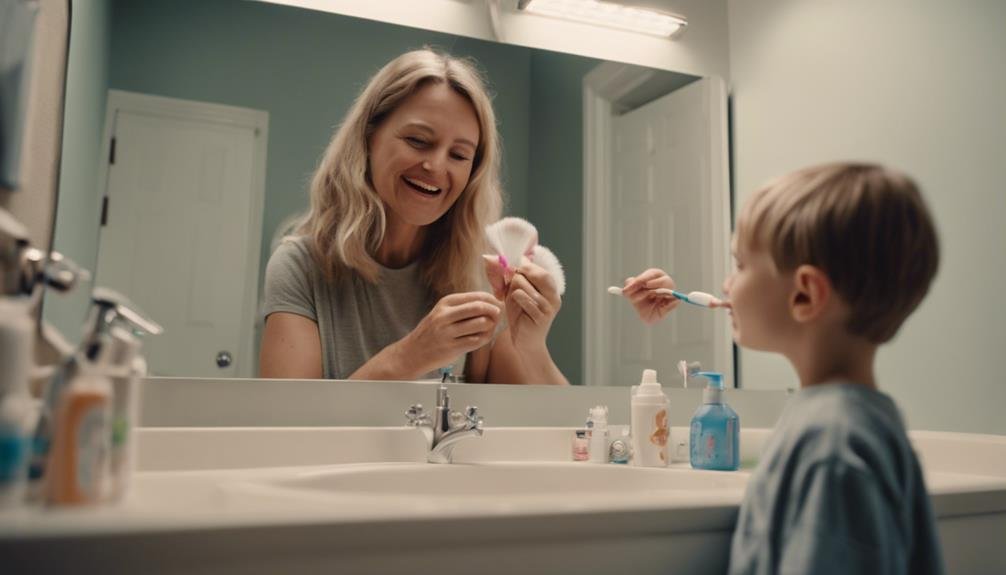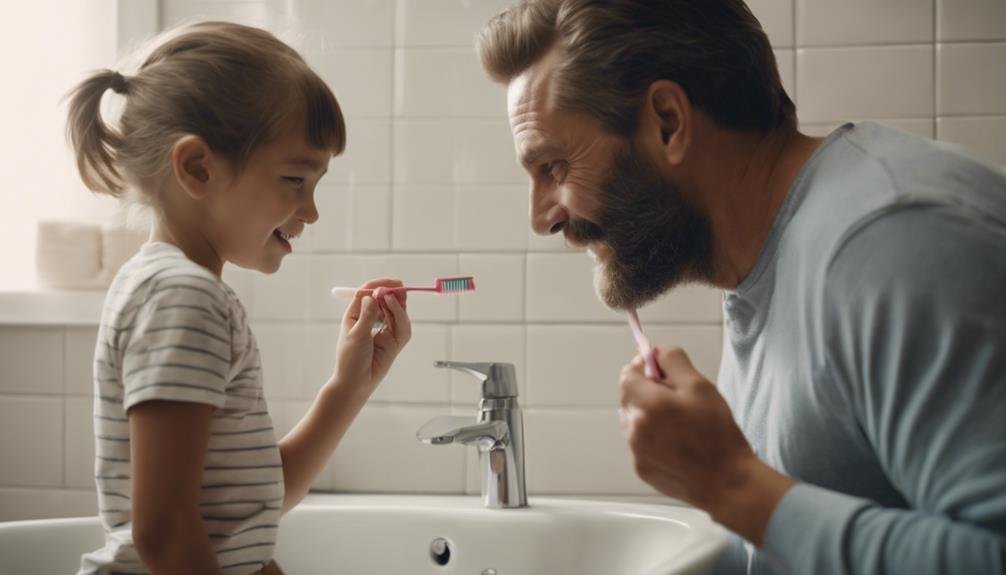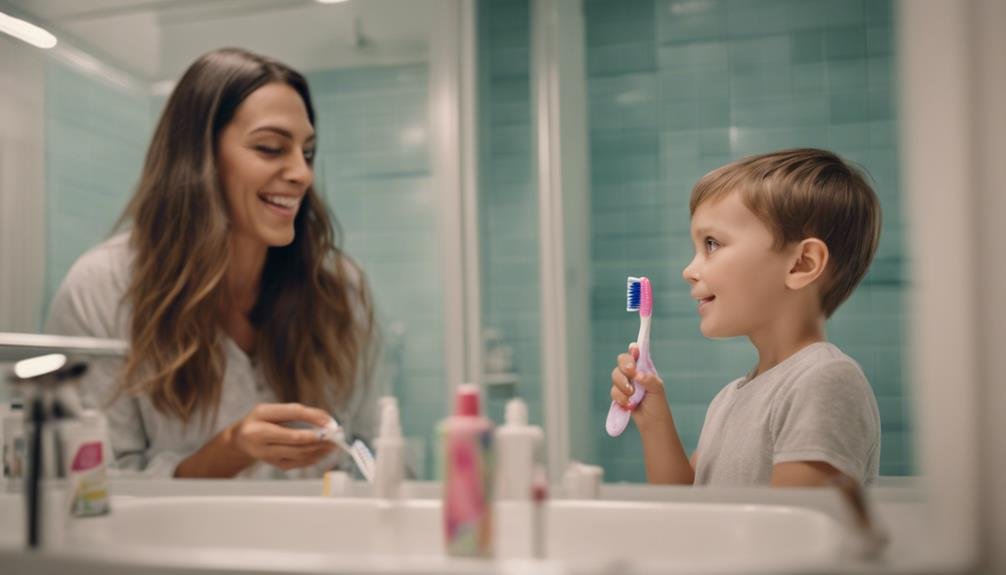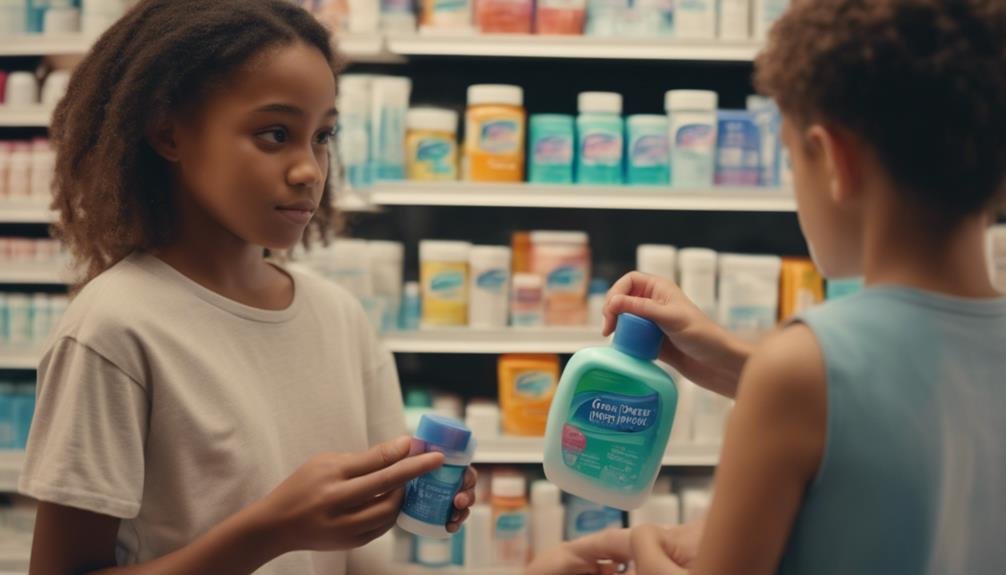"Cherishing Little Steps - A Haven for Baby and Family Journeys"
Tips for Teaching Your Child About Personal Hygiene
Did you know that studies show that only 33% of parents discuss personal hygiene with their children regularly? Ensuring your child understands the importance of personal hygiene is vital for their overall well-being.
From establishing a routine to addressing puberty-related hygiene, there are various effective strategies to teach your child about this essential aspect of self-care. By incorporating these tips into your parenting approach, you can help your child develop habits that will benefit them for a lifetime.
Key Takeaways
- Engage in interactive hygiene activities to make learning fun and memorable.
- Lead by example to instill good hygiene habits in your child.
- Communicate openly about hygiene to build confidence and trust.
- Establish consistent routines for morning, bedtime, and daily hygiene practices.
Importance of Personal Hygiene

Understanding why personal hygiene is important can help your child stay healthy and feel confident in their daily life. By teaching your child healthy habits such as washing their hands regularly, taking showers, and brushing their teeth, you're instilling practices that can prevent illness and promote overall well-being.
Encouraging your child to maintain good personal hygiene not only keeps them physically healthy but also contributes to their emotional and mental well-being. Feeling clean and fresh can boost their self-esteem and confidence, helping them navigate social interactions with ease.
Establish a Routine
To help your child develop good personal hygiene habits, it's important to establish a consistent routine that includes regular practices like washing hands, bathing, and dental care. Here are some tips to help you achieve this:
- Morning Routine: Start the day with a hygiene routine that includes brushing teeth, washing face, and combing hair. Encourage your child to follow a specific order to make the routine more structured.
- Bedtime Routine: Establish a calming bedtime routine that involves washing up, brushing teeth, and putting on clean pajamas. This won't only guarantee good hygiene but also signal to your child that it's time to wind down and prepare for sleep.
- Daily Habits: Incorporate daily habits like changing underwear, wearing clean clothes, and applying sunscreen when going out. Consistency is key to making these habits stick.
- Self-Care Practices: Teach your child about the importance of self-care practices like nail trimming, hair brushing, and using tissues for proper hygiene.
Lead by Example

Lead by setting a significant example for your child when it comes to practicing good personal hygiene habits. Children often learn best by observing the behaviors of those around them, especially their parents. Your actions have a substantial impact on your child's understanding and adoption of personal hygiene practices. By demonstrating proper hygiene habits yourself, you are effectively role modeling and showcasing the importance of cleanliness. Your parental influence plays a vital role in shaping your child's behavior and attitude towards personal hygiene.
To help you understand the influence of your actions, here is a table illustrating how your role modeling can impact your child's hygiene habits:
| Hygiene Habit | Parent's Behavior | Child's Response |
|---|---|---|
| Washing Hands | Regular handwashing | Mimicking behavior |
| Brushing Teeth | Consistent dental care | Establishing routine |
| Bathing | Daily showers | Understanding importance |
| Nail Care | Trimming nails regularly | Learning self-care |
Make It Fun and Interactive
Engage your child in enjoyable and interactive activities to promote positive personal hygiene practices. Making hygiene fun can help your child develop good habits that will stick with them for life. Here are some ways to make it engaging:
- Interactive Games: Turn brushing teeth or washing hands into a game. Use a timer and challenge your child to brush their teeth for the entire duration of their favorite song.
- Sing-Along Songs: Create catchy songs about washing hands or taking a bath. Encourage your child to sing along while performing these tasks.
- Storytelling: Share stories with hygiene-related themes. This can make learning about personal hygiene more exciting and relatable for your child.
- Reward System: Implement a reward system where your child earns stickers or small treats for practicing good hygiene habits consistently.
Use Age-Appropriate Language
When teaching your child about personal hygiene, it's essential to use language that's appropriate for their age and level of understanding. Using visual aids like pictures or videos can help make the concepts more tangible and easier for your child to grasp. Incorporating games into the learning process can also make it fun and engaging for them.
By using age-appropriate language, you can make sure that your child comprehends the importance of personal hygiene without feeling overwhelmed or confused. Keep your explanations simple and clear, focusing on the basics like washing hands, brushing teeth, and taking baths. Avoid using overly technical terms that might be too advanced for their current stage of development.
Visual aids such as colorful posters or interactive apps can capture your child's attention and make learning about personal hygiene more enjoyable. Games that involve matching activities or role-playing scenarios can reinforce good hygiene habits in a playful manner. Remember, the goal is to educate your child in a way that's both informative and entertaining.
Teach Proper Handwashing Techniques
To guarantee your child grasps the importance of personal hygiene, start by demonstrating and explaining proper handwashing techniques.
Here are some tips to help you teach your child the best handwashing practices:
- Use visual aids: Children often learn best through visual cues. Consider using posters or videos demonstrating the correct handwashing techniques to make learning fun and engaging.
- Proper drying: Teach your child the importance of drying their hands thoroughly after washing. Wet hands can spread germs more easily, so encourage them to use a clean towel or paper towel.
- Time management: Help your child understand the recommended duration for handwashing. Singing a song like 'Happy Birthday' twice can make it more enjoyable while ensuring they wash their hands for the recommended 20 seconds.
- Supervise and reinforce: Initially, supervise your child's handwashing routine to make sure they're following the correct steps. Provide positive reinforcement to encourage good habits and make it a part of their daily routine.
Demonstrate Dental Care Practices

Let's explore the importance of demonstrating proper dental care practices to your child to guarantee their oral hygiene remains in top condition.
Teaching your child to practice flossing and brushing teeth regularly is essential for maintaining healthy teeth and gums. By showing them how to floss correctly, you can help prevent cavities and gum disease by removing plaque from areas that brushing alone can't reach. Encouraging your child to brush their teeth at least twice a day with fluoride toothpaste is a crucial habit that can prevent tooth decay and bad breath.
Make dental care a fun and interactive experience for your child by setting a good example yourself. Show them the correct technique for brushing by using gentle circular motions along the gum line. Additionally, emphasize the importance of spending enough time on each tooth to make sure a thorough clean. By instilling these practices early on, you're laying the foundation for a lifetime of good oral hygiene habits.
Discuss the Importance of Clean Clothes
Show your child the importance of always wearing clean clothes to maintain good personal hygiene and overall well-being. Teaching them about laundry habits and clothing choices will instill a sense of responsibility towards cleanliness.
Here are some tips to guide you through this essential aspect of personal hygiene:
- Regular Laundry: Encourage your child to change into fresh clothes daily and to put worn items in the laundry basket.
- Stain Removal: Teach them basic stain removal techniques to guarantee their clothes stay clean and fresh.
- Fabric Care: Explain the importance of following care labels on clothing to maintain their quality and cleanliness.
- Clothing Choices: Help your child understand how choosing appropriate clothing for different activities can impact their hygiene and comfort.
Address Puberty-Related Hygiene

Address puberty-related hygiene by discussing the changes your body will go through and how to adapt your hygiene routine to maintain cleanliness and health during this shift.
Puberty brings about various transformations in your body, including an increase in sweat production that can lead to body odor. Crucial shower regularly, especially after physical activities, and use deodorant to manage body odor effectively. Additionally, as you start considering shaving, remember to use shaving cream or gel to reduce irritation and always shave in the direction of hair growth to prevent ingrown hairs. Proper shaving techniques can help you achieve smooth results while minimizing skin issues.
Crucial feel unsure or self-conscious during this period, but maintaining good hygiene practices won't only keep you feeling fresh but also promote your overall well-being. Embrace these changes with confidence, and remember that good hygiene is a crucial part of self-care during puberty.
Encourage Open Communication
As your child navigates through the changes of puberty, fostering open communication about personal hygiene is key to supporting their well-being and confidence. Here are some tips to help encourage open communication with your child:
- Create a Safe Space: Let your child know they can talk to you about anything without fear of judgment. This will make them more likely to open up about personal hygiene concerns.
- Lead by Example: Show your child the importance of healthy habits by practicing good personal hygiene yourself. This sets a positive example for them to follow.
- Ask Open-Ended Questions: Instead of yes or no questions, ask open-ended ones that encourage your child to express themselves. This can lead to deeper conversations about body care.
- Listen Actively: When your child does open up about personal hygiene, listen attentively without interrupting. This helps them feel valued and heard, strengthening your bond and trust.
Encouraging open communication about personal hygiene won't only help your child develop healthy habits but also foster a strong parent-child relationship based on trust and understanding.
Frequently Asked Questions
How Can I Help My Child Understand the Importance of Personal Hygiene Without Making Them Feel Embarrassed or Self-Conscious?
You can help your child understand personal hygiene without embarrassment by building confidence through age-appropriate conversations. Normalize hygiene practices, discuss their importance calmly, and lead by example. Encourage questions, listen actively, and praise efforts.
What Are Some Creative Ways to Incorporate Personal Hygiene Lessons Into Everyday Activities or Playtime?
Incorporate personal hygiene lessons into everyday activities by role-playing scenarios where you pretend to be different characters during bath time. Make bath time fun with games like "splash and scrub" to teach cleanliness in an enjoyable way.
How Can I Address Sensitive Topics Like Body Odor or Acne With My Child in a Positive and Supportive Manner?
When addressing sensitive topics like body odor or acne with your child, remember to approach it with body positivity and open dialogue. Communicate in a supportive manner, emphasizing that it's natural and offering solutions together for support.
Are There Any Resources or Books Specifically Designed to Help Parents Teach Children About Personal Hygiene?
Hey there, when it comes to teaching your child about personal hygiene, there are some fantastic resources available. Interactive apps, videos, storybooks, and parent guides can all be wonderful tools to make learning engaging and fun.
How Can I Handle Resistance or Pushback From My Child When It Comes to Practicing Good Hygiene Habits?
When your child resists good hygiene habits, acknowledge their feelings, explain the importance kindly, and offer choices to empower them. Make routines fun with songs or rewards. Consistency and patience are key to fostering habits.
Conclusion
Remember, teaching your child about personal hygiene is like planting seeds in a garden. By nurturing and caring for these seeds, you're helping them grow into healthy habits that will benefit your child for a lifetime.
So water those seeds of knowledge, give them plenty of sunshine, and watch as your child blossoms into a clean and confident individual.
Keep up the great work, parent!




